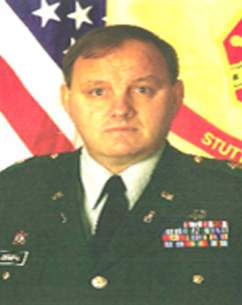COL Kenneth G. Juergens
 Colonel Kenneth G. Juergens was born on 27 January 1960 in Toronto Canada. Colonel Juergens graduated from US Military Academy at West Point in 1982 and from the US Naval War College in 2002 with a Master’s of Arts in National Security and Policy. Upon graduation from West Point, Colonel Juergens commissioned into the U.S. Army as a Second Lieutenant in the Ordnance Corps.
Colonel Kenneth G. Juergens was born on 27 January 1960 in Toronto Canada. Colonel Juergens graduated from US Military Academy at West Point in 1982 and from the US Naval War College in 2002 with a Master’s of Arts in National Security and Policy. Upon graduation from West Point, Colonel Juergens commissioned into the U.S. Army as a Second Lieutenant in the Ordnance Corps.
Some of his first assignments include Maintenance Platoon Leader and Shop Officer in a Maintenance Company in Germany and Aide-de-Camp to the DCG, 21st Support Command. His first command was in the 4th Infantry Division, Fort Carson, Colorado. He also served as one of the first Support Operations Officer as a Captain. He was competitively selected by the Ordnance Corps to attend Advanced Civil Schooling at Babson College where he distinguished himself and the Corps by graduating with Honors.
After Graduate School, he was assigned to the US Army Tank and Automotive Command where he distinguished himself through helping to design the path forward for the continued production of the Abrams Tank in Lima, OH as well as being assigned to the Source Selection Board for the Marine Corps Light Armored Vehicle – Air Defense program; receiving a letter of appreciation for his efforts by future Ordnance Hall of Famers’ BG James Monroe and Mr. Henry Jones.
Following Command and General Staff College, he was assigned to the 25th Infantry Division. He served as a Forward Support battalion Support Operations Officer, a Brigade S3 and as the Division’s Deputy G4. During this assignment, he was deployed to Uphold Democracy, Haiti as an acting Forward Support Battalion Commander within the 1st Brigade Combat Team.
Following 25th ID, he was assigned to a joint assignment with U.S. Southern Command in Miami, FL within the G4. As an operations officer and Deputy G4, he was assigned to help move the command from Panama to Florida spending many months in Panama. He was also involved in relief efforts for Hurricane Mitch. He then was selected below zone to Lieutenant Colonel and for battalion command.
In the early 2000s he served as the battalion commander of the 548th Corps Support Battalion, 10th Mountain Division, Fort Drum, New York where he commanded a 679 Soldier battalion providing maintenance, supply and service, transportation, and chemical support. His battalion completed numerous achievements to include live fire convoy training, successful deployment, and evaluation at the JRTC, Fort Polk, LA, Commander in Chief awards and ARTEPs. Later, as the Deputy Commander/Chief of Staff, 1st Recruiting Brigade at Fort Meade, Maryland, he was responsible for leading a 2,600-member recruiting team with specific recruiting territories spanning seventeen states from Maine through Virginia. Under his leadership his team pulled together an impressive string of victories in difficult markets such as New York City, New Jersey, West Virginia and New England.
In the mid-2000s COL Juergens found himself in Europe where he served as the Deputy G4 for Logistics, United States Army Europe, Heidelberg, Germany; Brigade Commander, 6th Area Support Group later reflagged as the US Army Garrison Stuttgart and Garmisch, Stuttgart, Germany; and was responsible for standing up the newly created AFRICOM and delivering installation support to a population of 19,000 overseas (EUCOM, AFRICOM, and George C. Marshall School). Colonel Juergens was responsible for providing logistic support planning and coordination for the Army in Europe. His actions in Europe helped to shape distribution management systems which integrated doctrine, technology, and facilities into an improved inter-modal distribution lane concept. He retired after brigade command with General Ward, AFRICOM CG presiding over the ceremony.
COL Juergens accomplishments spanned the globe from deploying an FSB to Haiti; to repatriating numerous illegal Chinese emigrants from a boat in the Caribbean; Hurricane Mitch humanitarian relief operations that enormously affected several nations to include Nicaragua, Honduras, Belize and others as well as millions of people. He also was directly involved in going to Brazil to negotiate the successful logistical hand off between the United States and Brazil for the Military Observer Mission Ecuador-Peru (MOMEP) mission. The MOMEP was created by the United States, Argentina, Chile and Brazil to verify ceasefire agreements in disputed areas following a border conflict that erupted between Ecuador and Peru in January 1995.
Colonel Juergens retired 31 August 2007 after 25 years of exemplary service. His awards include the Legion of Merit, Defense Meritorious Service Medal, Meritorious Service Medal (6th award), Joint Service Commendation Medal, Army Commendation Medal, Arm Achievement Medal (2nd award), National Defense Service Medal (2nd award), Armed Forces Expeditionary Medal and Global War on Terrorism.